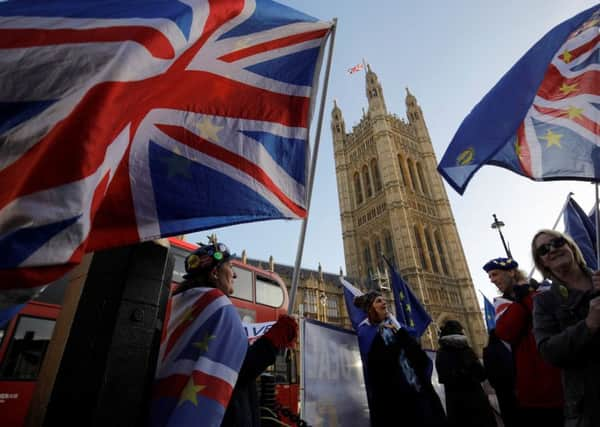“There was more than a fair smattering of young people in Parliament Square wielding banners in favour of leaving the EU”


One of the claims taken as read is that the younger generation is necessarily against Brexit. That was not apparent at the rally in Westminster on March 29.
There was more than a fair smattering of young people in Parliament Square wielding banners in favour of leaving the EU. The same was true of the contingent from France representing Frexit, with whom we were glad to exchange greetings.
Advertisement
Hide AdAdvertisement
Hide AdHugh Ball advises us (letters, April 12) to regard the Bank of England’s pronouncements about the cost of the operation so far. We can only hope that their reportage of what has happened is rather more reliable than their forecasts of doom and gloom the moment we had voted to Leave. Mark Carney had to apologise for getting it wrong. Indeed only last week when Mr Carney warned that the chances of leaving the EU without a deal had become ‘alarmingly high’, it barely registered in the financial markets. But let us consider Mr Ball’s figure of £64 billion as the cost of the operation so far. If we were to leave on WTO terms, we would immediately save £39 billion, and £10 billion a year thereafter. It would not take long to recoup the cited £64 billion.
Mr Ball also talks of the 44% of our export trade going to Europe. Fifteen years ago it was 62%. The continuing decrease over the years does not bode well for future possibilities, especially in a scenario where the EU sells far more to us that we do to them, the deficit having increased from £68 billion in 2015 to something approaching £90 billion today. In that light it is difficult to see the impediments to British businesses in doing business with the EU.
Mr Ball avers that the young see reduced opportunities for work because of what he calls Brexit-induced exit of business. Shortly before the referendum Allister Heath wrote of the pitfalls of paying attention to forecasts.
All the banks, Heath reminded us, said that the City would be toast if we kept the pound. Then the euro was launched and activity migrated here in astonishing numbers, finishing off most of continental Europe as a centre for wholesale finance.
Advertisement
Hide AdAdvertisement
Hide AdWe were also told repeatedly that several large banks would quit London as a result of the post-credit crunch regulatory and tax backlash. HSBC spent a long time and a lot of money considering its HQ location. There was talk that Standard Chartered and even Barclays might leave. Nothing happened. In fact HSBC’s high-profile decision to stay was the final nail in the coffin of that bank exodus idea.
Once again we are told of the ‘hardships’ young people would face in working in and travelling around Europe in the future. So what if they had to carry extra documents than they do now, or that crossing borders would take a little more time?
Roger Bootle has commented on the idea that the single market enables people to live and work anywhere within the EU, with benefit to their own enjoyment and fulfilment. Said Bottle: ‘Surely this is nice to have but hardly earth-shattering’.
I remain to be convinced that the younger generation would not consider foregoing all the easy times they now have for the sake of being part of a country where policies on laws, borders and money could be decided within its borders rather than subject to unelected bureaucrats without.